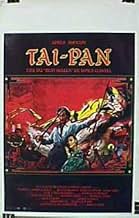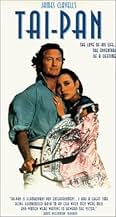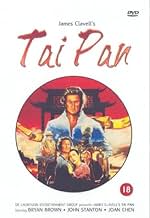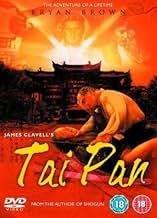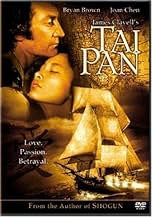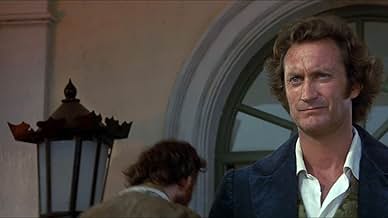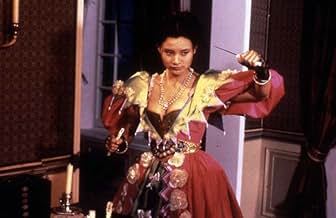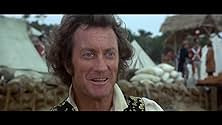IMDb रेटिंग
5.6/10
2 हज़ार
आपकी रेटिंग
अपनी भाषा में प्लॉट जोड़ेंHistorical fiction set against the backdrop of Hong Kong in its early years of British rule.Historical fiction set against the backdrop of Hong Kong in its early years of British rule.Historical fiction set against the backdrop of Hong Kong in its early years of British rule.
- पुरस्कार
- 2 कुल नामांकन
फ़ीचर्ड समीक्षाएं
As a movie reviewer for my college newspaper, I often was told: "You've got a great job, you get paid to go to movies." My standard answer was: "It's not that great - I had to sit through 'Tai-Pan'." The only movie that has given me more pain was "Ishtar."
TAI-PAN
Aspect ratio: 2.39:1 (J-D-C Scope)
Sound format: Dolby Stereo
1840's China: Thrown off the mainland because of his opium dealings, a western merchant (Bryan Brown) sets up home on the island of Hong Kong where he faces conflict from friend and foe alike in the lead-up to colonization.
Hugely derided at the time of its release, this handsome production - based on the novel by James Clavell, and directed by TV specialist Daryl Duke (THE THORN BIRDS) - plays to the gallery at every turn, embracing the book's labyrinthine plot and outrageous melodrama with unashamed fervour, an approach which appears to have sealed its fate at the box-office. The movie opens a little too abruptly, indicating a troubled post-production, but John Briley's busy screenplay (co-written with Stanley Mann) unfolds against a colorful historical backdrop and includes just enough nudity and violence to keep boredom at bay. Brown's performance is compromised by an unconvincing Scottish accent, and he's upstaged by Joan Chen (THE LAST EMPEROR) as the Chinese girl who loves him regardless of his failings, while handsome Tim Guinee (HOW TO MAKE AN American QUILT) is achingly sincere as Brown's naive young son, led astray by villainous merchants plotting his family's downfall. Also starring John Stanton, Russell Wong, Norman Rodway, Kyra Sedgwick and Bert Remsen in supporting roles. Production values strive to capture an epic feel and are largely successful, though no one's ever going to mistake this for "Lawrence of Hong Kong"! Italian makeup maestro Giannetto de Rossi (a regular contributor to the films of Lucio Fulci) provides some occasional flashes of gore, including a brief - but realistic - decapitation near the beginning of the picture.
Aspect ratio: 2.39:1 (J-D-C Scope)
Sound format: Dolby Stereo
1840's China: Thrown off the mainland because of his opium dealings, a western merchant (Bryan Brown) sets up home on the island of Hong Kong where he faces conflict from friend and foe alike in the lead-up to colonization.
Hugely derided at the time of its release, this handsome production - based on the novel by James Clavell, and directed by TV specialist Daryl Duke (THE THORN BIRDS) - plays to the gallery at every turn, embracing the book's labyrinthine plot and outrageous melodrama with unashamed fervour, an approach which appears to have sealed its fate at the box-office. The movie opens a little too abruptly, indicating a troubled post-production, but John Briley's busy screenplay (co-written with Stanley Mann) unfolds against a colorful historical backdrop and includes just enough nudity and violence to keep boredom at bay. Brown's performance is compromised by an unconvincing Scottish accent, and he's upstaged by Joan Chen (THE LAST EMPEROR) as the Chinese girl who loves him regardless of his failings, while handsome Tim Guinee (HOW TO MAKE AN American QUILT) is achingly sincere as Brown's naive young son, led astray by villainous merchants plotting his family's downfall. Also starring John Stanton, Russell Wong, Norman Rodway, Kyra Sedgwick and Bert Remsen in supporting roles. Production values strive to capture an epic feel and are largely successful, though no one's ever going to mistake this for "Lawrence of Hong Kong"! Italian makeup maestro Giannetto de Rossi (a regular contributor to the films of Lucio Fulci) provides some occasional flashes of gore, including a brief - but realistic - decapitation near the beginning of the picture.
Last night on Turner Classic Movies, I saw a trailer from the sixties called "Lion Power" about all the big projects audiences could expect from MGM in the months and years ahead. Included among them were clips from "Far From the Madding Crowd" and "Where Were You When the Lights Went Out?", plus mention of "Where Eagles Dare" with Richard Burton (not mentioning Clint Eastwood, as perhaps he wasn't signed yet), "Ice Station Zebra", and "2001: A Space Odyssey" with very early-form artwork of its making. Among the many films mentioned in passing near the end of the trailer was "James Clavell's 'Tai-Pan'", yet no earlier version of the film was ever made. Just how long was this thing in the making, and what casts were potentially involved at different times? It would be interesting to see the planned history of such a movie that took so long to finally get made, bad as it reportedly is.
I found this movie to follow the novel pretty closely, considering of course that the novel is about 900 pages and the movie is only two hours! While not of the same outstanding caliber of adaptation as the Shogun miniseries, it nevertheless manages to generate some excitement and give a flavor for the happenings of that period, during which the colony of Hong Kong was founded.
Joan Chen was especially good as Mai-Mai, and all the other parts were at least adequately cast. The locations, sets and production values were of uniformly good quality. The only thing lacking was enough time to tell a story this long and complex--in such a short production one only has time to hit the high points of the plot. But it was enjoyable nevertheless.
Joan Chen was especially good as Mai-Mai, and all the other parts were at least adequately cast. The locations, sets and production values were of uniformly good quality. The only thing lacking was enough time to tell a story this long and complex--in such a short production one only has time to hit the high points of the plot. But it was enjoyable nevertheless.
It's worth pointing out that I came to this film having read James Clavell's excellent novel, TAI-PAN, on which this is based. If I hadn't read the book beforehand, I probably would have enjoyed this adaptation a lot more.
Sadly, I was left feeling that the filmed TAI-PAN is a crushing disappointment, purely because it cuts so very much out of the story. The whole background is missing, the Triad stuff, the politics, the trade with the Chinese. The story is reduced to the human relationships and particularly the family rivalries between the main characters, but there was so much more to it than that.
I do understand that films are very different to books and that adaptations have to cut material out, but TAI-PAN has a two hour running time and a lot of it is slow-paced. If it had told events at a much faster pace, it would have been able to include a lot more of the details and subtleties that are missing here. As it is, there are elements of greatness - plus the novelty of seeing Bryan Brown in a leading role - but it could have been so much more. A miniseries would suffice better, I think.
Sadly, I was left feeling that the filmed TAI-PAN is a crushing disappointment, purely because it cuts so very much out of the story. The whole background is missing, the Triad stuff, the politics, the trade with the Chinese. The story is reduced to the human relationships and particularly the family rivalries between the main characters, but there was so much more to it than that.
I do understand that films are very different to books and that adaptations have to cut material out, but TAI-PAN has a two hour running time and a lot of it is slow-paced. If it had told events at a much faster pace, it would have been able to include a lot more of the details and subtleties that are missing here. As it is, there are elements of greatness - plus the novelty of seeing Bryan Brown in a leading role - but it could have been so much more. A miniseries would suffice better, I think.
क्या आपको पता है
- ट्रिवियाProducer Martin Ransohoff and the Metro-Goldwyn-Mayer studio in 1966 acquired the rights to James Clavell's source "Tai-Pan" novel for US $500,000. The movie was then announced by MGM in 1967-68 to star Patrick McGoohan to play Dirk Struan, to be directed by Michael Anderson, with source novelist Clavell writing the screenplay. The picture was originally budgeted to cost US $26 million which was then reduced to US $20 million. The project sat around stagnant for a time in development hell. However, after severe operating losses, the epic was one of a number of expensive projects the new management at the MGM studio dropped as being too costly. The project and the development of the movie at MGM was in the end canceled by executive James T. Aubrey.
- गूफ़In a scene, set in 1841, several of the ladies were wearing bright mauve outfits. That would have been most unlikely for the wives of middle class traders at that time as the color purple was prohibitively expensive before the invention of analine dyes in London - in 1856. By 1870 these gaudy colors had become so cheap and commonplace that it became a status symbol to mimic the subtler, paler colors of the pre analine dye days.
- भाव
Dirk Struan: No emperor has seen the guns of a British man-of-war.
टॉप पसंद
रेटिंग देने के लिए साइन-इन करें और वैयक्तिकृत सुझावों के लिए वॉचलिस्ट करें
- How long is Tai-Pan?Alexa द्वारा संचालित
विवरण
बॉक्स ऑफ़िस
- बजट
- $2,50,00,000(अनुमानित)
- US और कनाडा में सकल
- $40,07,250
- US और कनाडा में पहले सप्ताह में कुल कमाई
- $18,63,469
- 9 नव॰ 1986
- दुनिया भर में सकल
- $40,07,250
- चलने की अवधि2 घंटे 7 मिनट
- ध्वनि मिश्रण
- पक्ष अनुपात
- 2.35 : 1
इस पेज में योगदान दें
किसी बदलाव का सुझाव दें या अनुपलब्ध कॉन्टेंट जोड़ें


